Managing hypertension can feel overwhelming, but it doesn't have to be! Understanding your blood pressure and how it fluctuates is the first step toward a healthier life. With the right monitoring habits and lifestyle changes, you can take control and make informed choices. Ready to discover practical tips and advice for effective hypertension management? Let's dive in!
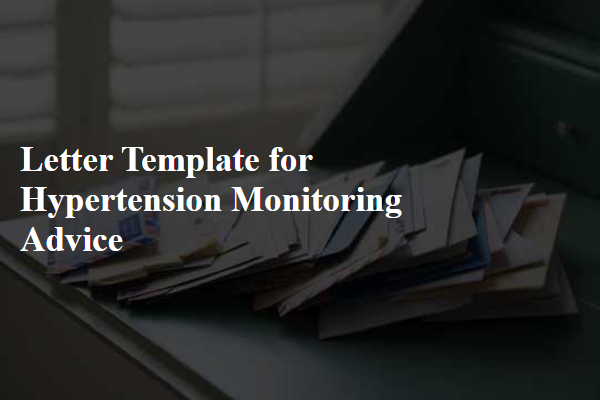
Personalization and patient details
Hypertension, commonly referred to as high blood pressure, significantly impacts cardiovascular health, with approximately 1.13 billion people affected globally. Effective monitoring is crucial for individuals diagnosed with this condition. Regular blood pressure readings, ideally at home with a validated digital sphygmomanometer, can help track fluctuations in systolic and diastolic measurements. Maintaining a healthy lifestyle is essential; adhering to a low-sodium diet, which typically recommends less than 2,300 mg of sodium per day, can visibly improve blood pressure levels. Engaging in physical activity, such as at least 150 minutes of moderate aerobic exercise weekly, plays a vital role in weight management and stress reduction. Additionally, consistent follow-ups with healthcare providers in designated clinics or hospitals, specifically those well-versed in hypertension management, ensure personalized care plans and medication adjustments based on blood pressure trends. Understanding the importance of these steps is fundamental for better health outcomes and long-term management of hypertension.
Explanation of hypertension and risks
Hypertension, also known as high blood pressure, is a chronic medical condition characterized by elevated force of blood against artery walls, often measured using the systolic (top number) and diastolic (bottom number) values. The Centers for Disease Control and Prevention (CDC) recognize hypertension as a silent disease, affecting nearly 47% of adults in the United States alone. Prolonged hypertension can lead to significant health risks, including heart disease, stroke, and kidney failure. Blood pressures exceeding 130/80 mmHg have been associated with increased cardiovascular complications. Effective management of hypertension involves regular monitoring at home or through healthcare providers, lifestyle modifications such as reducing sodium intake, regular physical activity, and adherence to prescribed medications. Understanding the importance of monitoring is critical to reduce the risk of life-altering health events associated with uncontrolled hypertension.
Monitoring guidelines and methods
Effective hypertension monitoring is essential for managing high blood pressure levels (140/90 mmHg or higher). Regularly measuring blood pressure, ideally at the same time daily, helps identify patterns and effectiveness of treatment. Home blood pressure monitors, equipped with validated oscillometric technology, are recommended for ensuring accuracy. Patients should rest for at least five minutes before measurement, sitting comfortably with the arm supported at heart level. Keeping a log of readings including date, time, and activity can facilitate valuable discussions with healthcare professionals. Periodic visits to a healthcare provider can ensure methods align with overall management strategies, like medication adjustments or lifestyle changes.
Lifestyle and dietary recommendations
Hypertension, commonly known as high blood pressure, requires careful management through lifestyle and dietary adjustments. Engaging in regular aerobic exercises, such as brisk walking (30 minutes daily), can significantly lower blood pressure levels, promoting cardiovascular health. Adopting the DASH diet (Dietary Approaches to Stop Hypertension), which emphasizes fruits, vegetables, whole grains, and lean proteins, can reduce sodium intake to less than 2,300 mg (ideally 1,500 mg) per day to prevent further complications. Limiting alcohol consumption, keeping it to one drink daily for women and two for men, also aids in blood pressure control. Monitoring body weight and maintaining a healthy Body Mass Index (BMI) between 18.5 and 24.9 can positively influence overall blood pressure readings. Incorporating stress management techniques, like mindfulness or yoga, can enhance psychological well-being while effectively managing hypertension.
Follow-up and contact information
Hypertension management is crucial for maintaining cardiovascular health. Regular monitoring of blood pressure levels (ideally below 120/80 mmHg for optimal results) is essential. Patients should be educated on the importance of consistent readings, utilizing home devices or visits to healthcare facilities, such as clinics or hospitals. It's beneficial to maintain a symptom diary, noting any occurrences such as headaches or dizziness that may indicate fluctuations in blood pressure. Patients are encouraged to establish follow-up appointments every three to six months, depending on individual risk factors. Important contact information for local health practitioners or support services can also provide additional resources for effective hypertension management.
Letter Template For Hypertension Monitoring Advice Samples
Letter template of hypertension monitoring recommendations for caregivers.
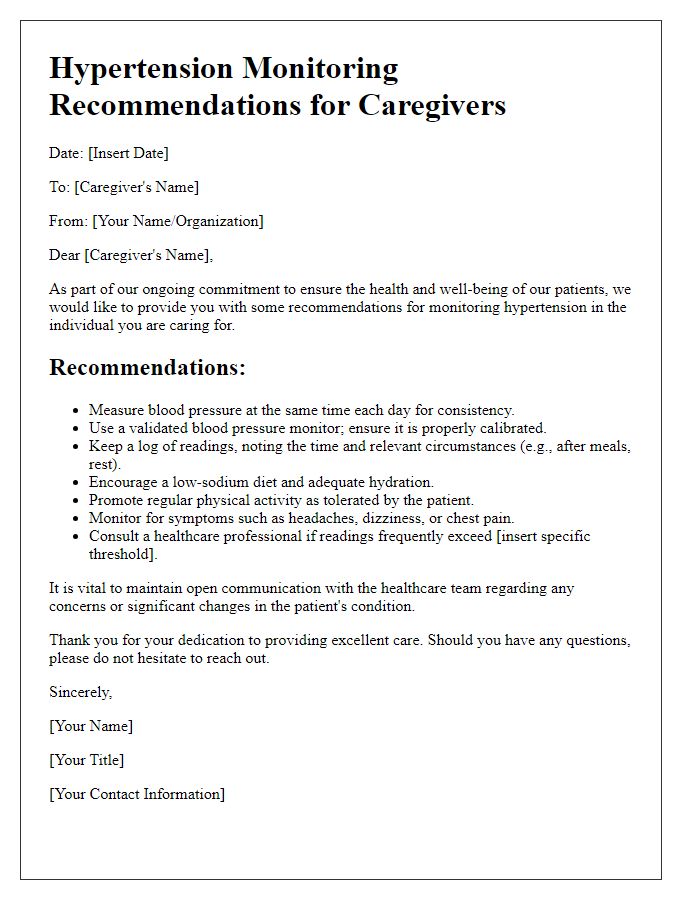
Letter template of hypertension follow-up advice for healthcare providers.
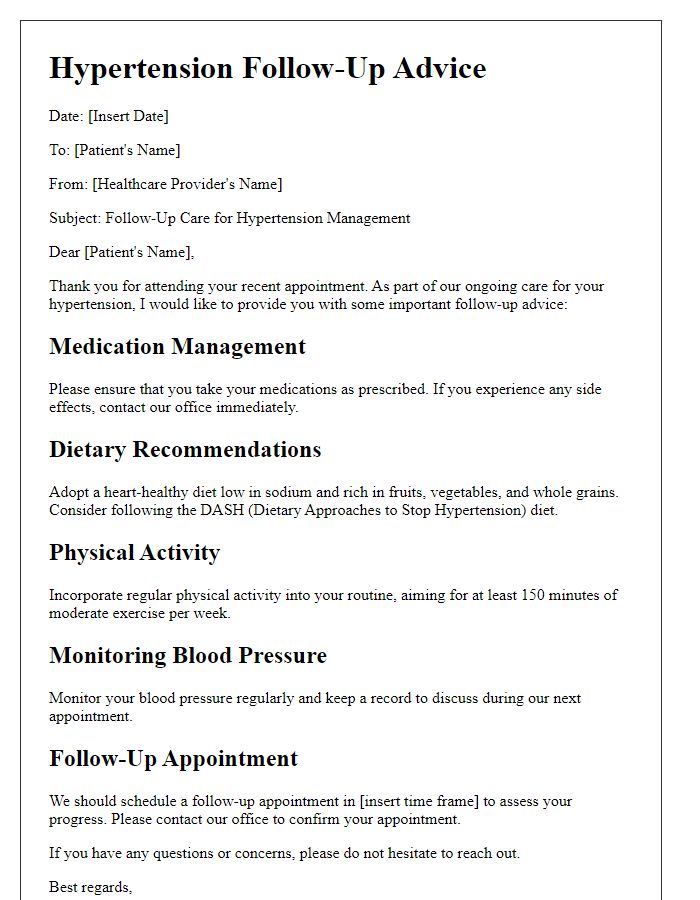
Letter template of hypertension screening suggestions for community outreach.
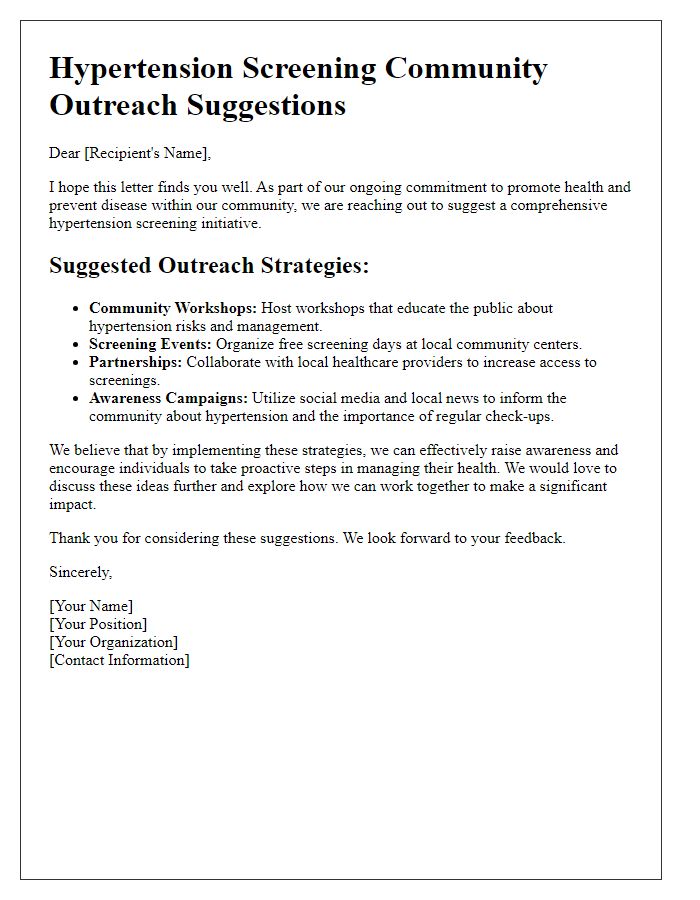
Letter template of hypertension awareness information for public health initiatives.
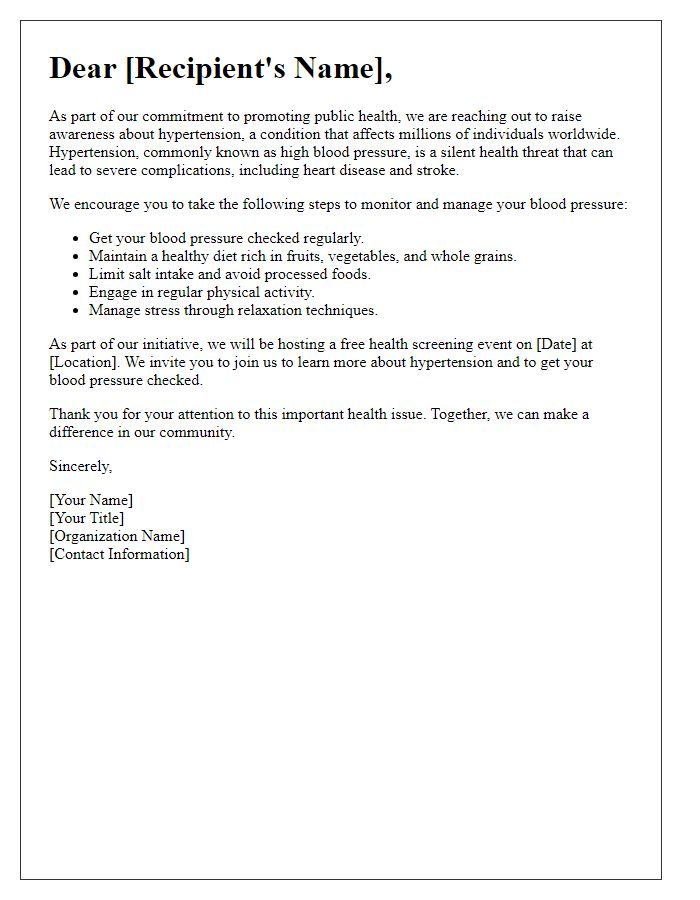
Letter template of hypertension patient education resources for clinics.
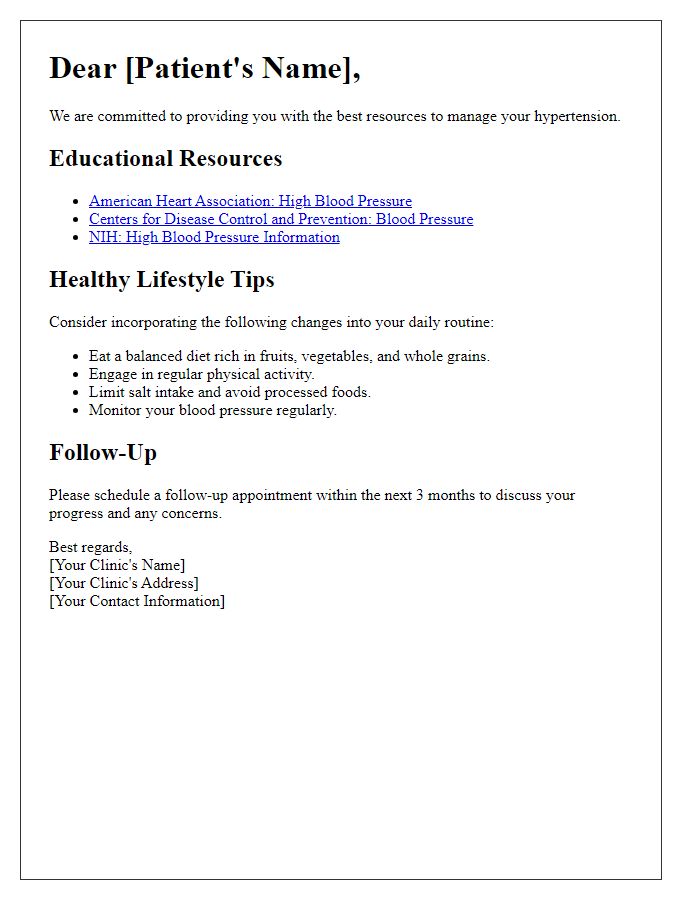

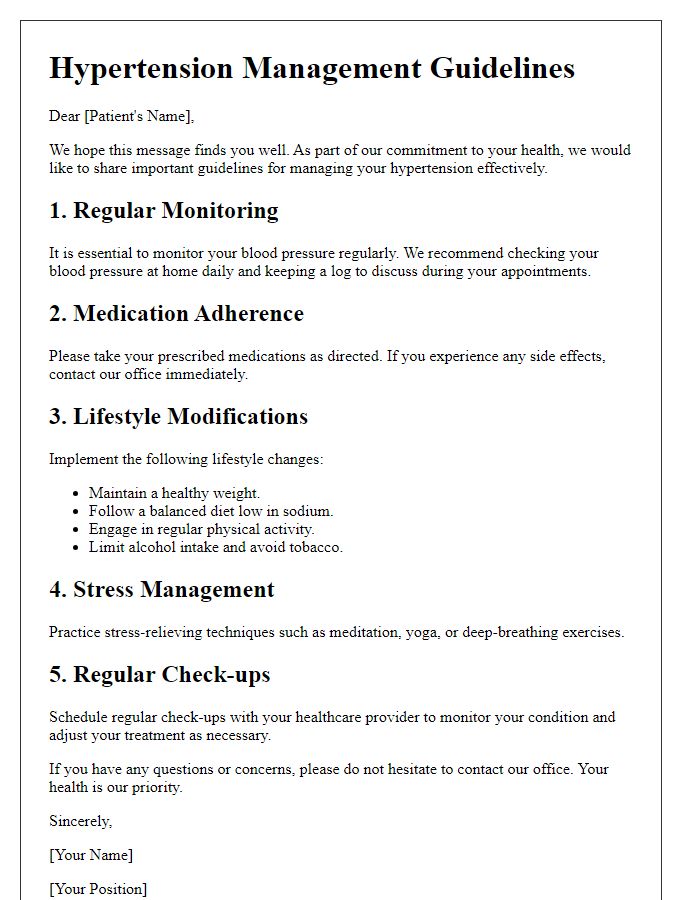
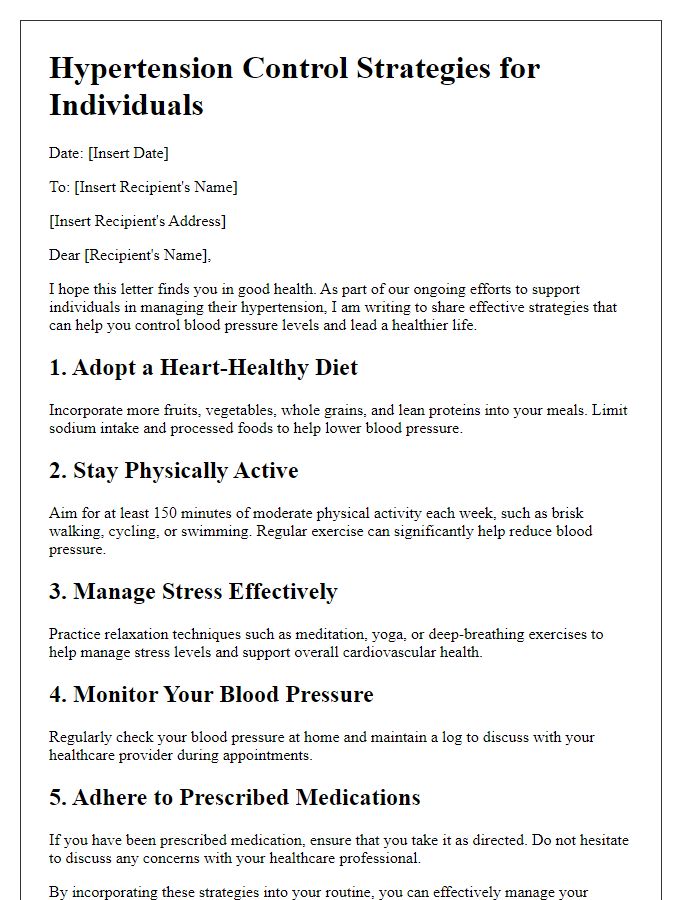
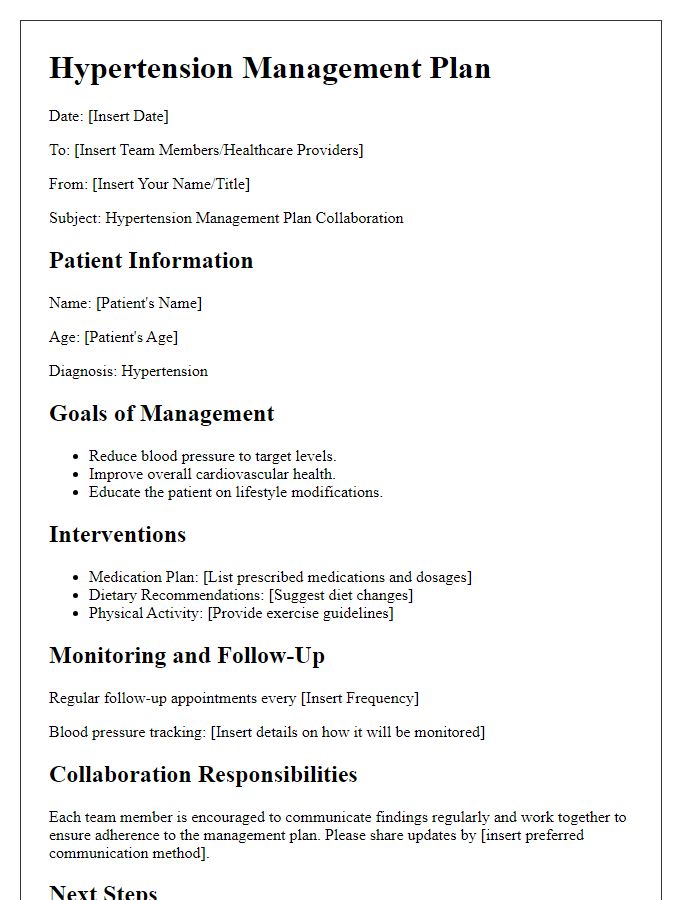
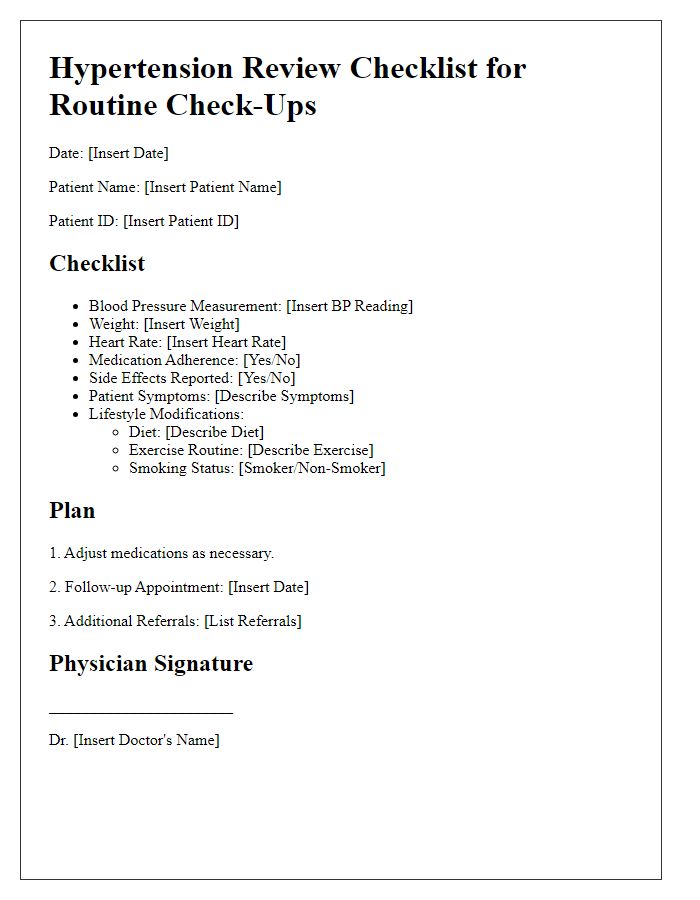

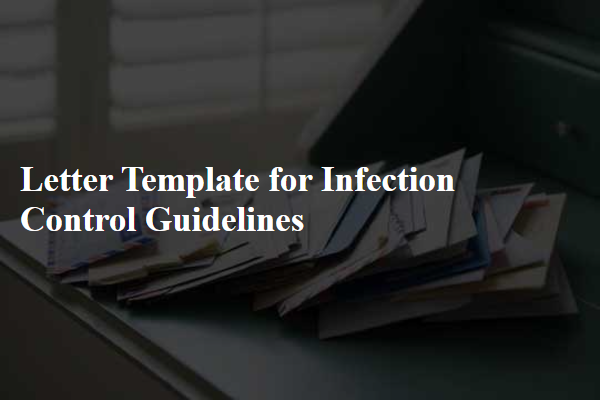
Comments